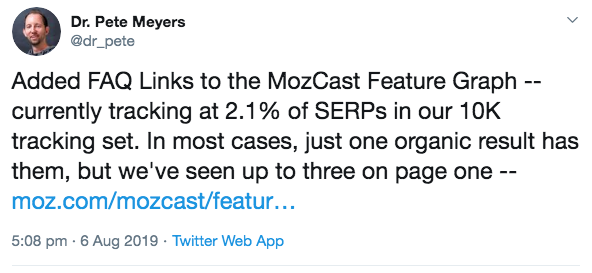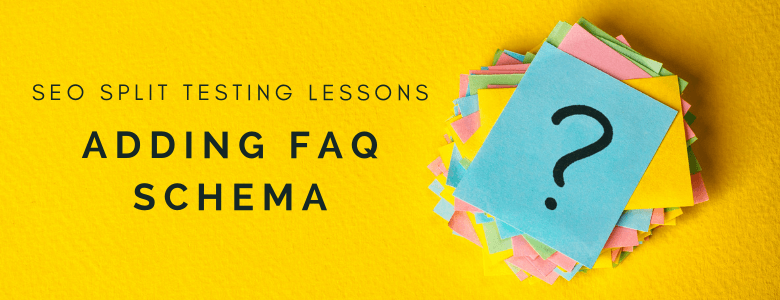-1-2.png)
As much as we raise alarm about the constant change in Google SERPs, us SEOs love new things with FAQ schema being the latest example. Some are reporting how much they love it, others are saying they’re losing clicks because of it. Here’s a handful of the Twitter buzz:
-1-1.png)
-1-1.png)
-1-1.png)
-1-1.png)
Does winning FAQ snippets improve click-through rates?
Naturally, we wanted to test it using SearchPilot to find out for ourselves. In the vertical we have been testing in, commercial pages winning FAQ snippets have quickly started to dominate the landscape.
We believed that the extra real estate these snippets cause a search result to take up on the SERP would lead to higher click-through-rates in these instances, as the primary head terms our pages were ranking for were not informational queries, but transactional ones meaning the user intent was not going to be fully satisfied from the snippet itself.
Following an already positive test to add on-page FAQ content for a number of domains, we later also tested adding FAQ schema markup to that content. When positive, we saw uplifts in traffic to commercial pages ranging from 3% to 8% – so it doesn’t seem like we’ve lost any clicks over here.
Others in the SEO community have worked around the decrease in clicks they saw from winning these snippets, likely as a result of users getting their answer on the SERP, by adding in additional links to their sites within the answers. However, we did not do that in any of the tests that we ran. Our snippets only had brief answers. All of the uplift in traffic gained was to the specific pages that were ranking.
The positive result we saw for the tests we ran where we just added in FAQ schema markup supports our theory that the uplift in traffic primarily came from an increase in organic clicks as a result of our listings taking up more real estate in the SERP.
Does ranking position impact the chance of winning FAQ snippets?
These were pages already ranking well (often in position one), so if the uplift were to be caused by an improvement in rankings, it would have mostly been due to ranking for more keywords, rather than improving rankings for keywords we already ranked for.
The fact the tests we ran where we added both FAQ schema markup and on-page FAQ content were more positive than those where we just added markup to already existing content suggests that in these instances there was likely a combined effect of improved rankings and improve organic click-through-rates. This makes sense though; adding in new content shouldn’t have a direct impact on your organic click-through-rates.
In summary, we have only seen good results with adding in both FAQ content and FAQ schema. However, one problem we did run into in a different vertical was not being able to actually win the FAQ snippets, despite correctly implementing FAQ schema.
In this vertical, the site we’ve run this test on does not rank as highly as the site we ran the tests discussed previously on. We’re not sure if rankings play a role in your likelihood to win FAQ snippets, so we are running further tests right now to try and disprove that hypothesis.
Things to be aware of in your FAQ snippets
We have two other hypotheses for why we may not be winning FAQ snippets in this vertical. First, it may be that in this particular vertical, Google is not awarding the FAQ snippets to multiple organic results. Dr. Pete Meyers has shared on Twitter insights around this they are beginning to pull in from MozCast Feature Graph:

Our second theory as to why we may not be winning the snippets, which we are currently testing, is that the answers we are providing are not providing quality answers to users questions. Due to how we were pulling the content from the page into the schema in our first test, we were missing out parts of the answers and therefore not fully answering the question.
We’re fixing this problem now and can follow up with the results in the coming weeks. Reading into Google’s guidelines, there are two requirements we’re not entirely confident we’ve fulfilled - one, as outlined above, to “Make sure each Question includes the entire text of the question and make sure each Answer includes the entire text of the answer. The entire question text and answer text may be displayed.”
The second was to not use “FAQPage for advertising purposes.” We hadn’t done this intentionally, but parts of our answer were referencing out the website, so we will be looking to remove that in the upcoming test as well.
So far we’ve seen good results for sites with FAQ Schema
In conclusion, when we’ve won FAQ rich snippets we’ve seen significant uplifts in traffic, likely due to an increase in organic clicks. We also saw uplifts in organic traffic from adding FAQ content on-page without schema, and even further uplifts from adding both.
However, meeting Google’s guidelines seems to be important. Having correctly implemented schema won’t be enough to win the rich snippets, so make sure if you’re trying to win them to focus on the quality of your answers as well.
We have plans to release further case studies with results we’ve had from testing in SearchPilot in the near future, so stay tuned to hear what happens with the updated FAQ schema test we’re about to run, and other insights we’ve gained from our years of A/B testing.

